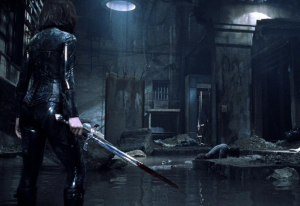Earlier this week, Star Trek: Voyager star Robert Picardo released a music video lamenting how he isn’t Star Trek: The Next Generation star Brent Spiner. Picardo played the holographic Doctor aboard Voyager, a role he won’t be returning to in the near future, which cast him as the same archetype as Spiner’s android Data. ComicBook.com spoke to Picardo about how he’s been spending the pandemic and what led to the creation of this music video. “Well, there’s a connection between both answers,” he says. “I’ve been very fortunate during the pandemic. I’m locked down in a beautiful part of the country. So I feel a little guilty and I feel nothing but sympathy for people like my two adult daughters who were locked down in little tiny apartments in New York during the first pan wave in New York. But the hardest part, of course, is not knowing how long it’s going to go on and all the anxiety of, what’s going to happen for everyone’s future in the world?
Videos by ComicBook.com
“But on a smaller scale, you just want to keep yourself busy and engaged. If you’re a performer who loves to perform, you find ways to perform in the middle of this. That’s why I was so impressed when my Star Trek colleague Brent Spiner made this video that he uploaded to Twitter, which was really poking fun at himself at being a technical Luddite, while at the same time, celebrating that he’s working on two different television series now. And it was such a gift to his fan base to make this joyful little video that I thought, well, that would be fun to do. Maybe I should do something like that. So what it kind of morphed into, because Brent Spiner and I played the two most well-known artificial-intelligence characters in the Star Trek world, I thought, how should I do this? My self-effacing video would be poking fun at my own career and at the same time paying homage to Brent.
“So I wrote this little satire based on a classic song from the Great Depression, ‘Brother, Can You Spare a Dime?’ and did an actor’s lament, I guess, so to speak. There’s a great tradition of actors poking fun at their own careers, so I’m lamenting that at that moment in my career, I’m not Brent Spiner rather than myself and having fun with the Star Trek fans knowing each of us, not only through our roles but through conventions and whatnot, quite well. And it was well-received, first and foremost, by Mr. Spiner, who very graciously, not only can take a joke, but he can also take a joke at my expense very well.”
Picardo also went into more detail about the similarities and differences and differences between his and Spiner’s Star Trek characters. He’s said in the past that he may have been a little intimidated when he realized the comparisons the two characters would draw.
“Well, I think that may have been my anxiety when I first got the role,” Picardo says. “In fact, I do remember thinking I would be compared with him simply because we are both artificial-intelligence characters. But Star Trek is very good. Very, very good. The writers are clever at taking something familiar to their audience or that has been before and then reinventing it, giving it a big twist. On the surface, the biggest difference was Data was an android and I was a holographically-projected computer program. So he’s hardware, and I’m software. And his character famously had no emotion, at least until they hit the big screen, and my character was programmed in order to develop a bedside manner as an emergency medical hologram. He was programmed with these emotional cues so that he could adapt, learn, and hopefully develop the empathy for his patients.
“What was fun about my character, and I think this is fairly different from what they did with Data, is that my character was quite willful, a piece of technology that didn’t quite work the way it had been designed to be because it was a new piece of technology. The essential joke, I think, was that he didn’t behave the way you wanted him to or expected him to and seem to have a quote ‘bad attitude’. What was similar, of course, were the issues that each character dealt with, the storylines of what constitutes an individual. At what point does a sentient artificial intelligence get accorded all of the full rights of a regular organic member of a team, a crew? And so those issues of entitlement and issues of being the outsider character who longs to be fully accepted by the group, those issues were similar. But we reacted to the same plot lines and stimuli in such different ways that I think that we were not compared in a way that I had anxiety about for very long.”
After seeing the first season of Star Trek: Picard, where star Santiago Cabrera portrayed a handful of holographic emergency crew, sometimes at the same time, Picardo still thinks there’s narrative gold to be minded from these kinds of characters. “First of all, it was a great showcase for that actor who did a terrific job,” Picardo says. “I think that it’s a logical extension of the EMH technology that another 25 years off, they would have extended that idea that if you need help in any aspect, especially on a small ship, that you could activate a sort of a human-looking interface that was a fix-it program or just it could handle basic problems you had with having a shortage of actual crew power, manpower, women-power.
“I think that was also a clever idea, a lot of the things in the imagining because Star Trek not only extends real science, but they build obviously on their own canon all the time. And the fans are very opinionated as to whether they’re going too far afield or they’re obeying the canon. But I thought the way the emergency holographic programs, that made a great deal of logical sense.”
The first season of Star Trek: Picard is streaming now on CBS All Access.








